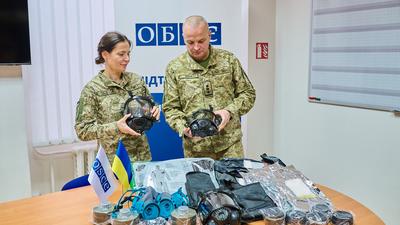-
Our work
-
Fields of work
- Arms control
- Border management
- Combating trafficking in human beings
- Conflict prevention and resolution
- Countering terrorism
- Cyber/ICT Security
- Democratization
- Economic activities
- Education
- Elections
- Environmental activities
- Gender equality
- Good governance
- Human rights
- Media freedom and development
- Migration
- National minority issues
- Policing
- Reform and co-operation in the security sector
- Roma and Sinti
- Rule of law
- Tolerance and non-discrimination
- Youth
- Field operations
- Projects
-
Meetings and conferences
- Summit meetings
- Review Conferences
- Ministerial Council meetings
- Plenary meetings of the Permanent Council
- Plenary Meetings of the Forum for Security Co-operation
- Security Review Conferences
- Annual Implementation Assessment Meetings
- Economic and Environmental Forum
- Economic and Environmental Dimension Implementation Meetings
- Human rights meetings
- Media conferences
- Cyber/ICT security conferences
- Conference of the Alliance against Trafficking in Persons
- Gender equality conferences
- Annual OSCE Mediterranean conferences
- Annual OSCE Asian conferences
- Partnerships
-
Fields of work
-
Countries
- All
-
Participating States
- Albania
- Andorra
- Armenia
- Austria
- Azerbaijan
- Belgium
- Belarus
- Bosnia and Herzegovina
- Bulgaria
- Canada
- Croatia
- Cyprus
- Czechia
- Denmark
- Estonia
- Finland
- France
- Georgia
- Germany
- Greece
- Holy See
- Hungary
- Iceland
- Ireland
- Italy
- Kazakhstan
- Kyrgyzstan
- Latvia
- Liechtenstein
- Lithuania
- Luxembourg
- Malta
- Moldova
- Monaco
- Mongolia
- Montenegro
- The Netherlands
- North Macedonia
- Norway
- Poland
- Portugal
- Romania
- Russian Federation
- San Marino
- Serbia
- Slovakia
- Slovenia
- Spain
- Sweden
- Switzerland – OSCE Chairpersonship 2026
- Tajikistan
- Türkiye
- Turkmenistan
- Ukraine
- United Kingdom
- United States of America
- Uzbekistan
- Asian Partners for Co-operation
- Mediterranean Partners for Co-operation
-
Structures and institutions
- Chairpersonship
-
Secretariat
- Secretary General
- Office of the Secretary General
- Conflict Prevention Centre
- Transnational Threats Department
- Office of the Special Representative and Co-ordinator for Combating Trafficking in Human Beings
- Office of the Co-ordinator of OSCE Economic and Environmental Activities
- Gender Issues Programme
- Opportunities for Youth
- Department of Human Resources
- Department of Management and Finance
- Office of Internal Oversight
- Documentation Centre in Prague
- Institutions
-
Field operations
- Presence in Albania
- Centre in Ashgabat
- Programme Office in Astana
- Programme Office in Bishkek
- Mission to Bosnia and Herzegovina
- Programme Office in Dushanbe
- Mission in Kosovo
- Mission to Moldova
- Mission to Montenegro
- Mission to Serbia
- Mission to Skopje
- Project Co-ordinator in Uzbekistan
- Closed field activities
- Parliamentary Assembly
- Court of Conciliation and Arbitration
- Organizational structure
- About us
News Item
OSCE equips Ukrainian border guards with new protective gear to strengthen chemical emergency response capacity
The OSCE Support Programme for Ukraine (SPU) has provided the State Border Guard Service of Ukraine (SBGS) with protective equipment to enhance its ability to respond swiftly and safely to chemical emergencies. The handover, which took place on 20 November 2025 in Kyiv, included 550 sets of coveralls (including suits, gloves, and over-boots), gasmasks with filters, 400 respirators with 2 filters each, and five portable decontamination systems designed to ensure immediate chemical decontamination for civilians and personnel near affected areas.

- Issued on:
- Issued by:
- OSCE Secretariat Extra-Budgetary Support Programme for Ukraine
The OSCE Support Programme for Ukraine (SPU) has provided the State Border Guard Service of Ukraine (SBGS) with protective equipment to enhance its ability to respond swiftly and safely to chemical emergencies. The handover, which took place on 20 November 2025 in Kyiv, included 550 sets of coveralls (including suits, gloves, and over-boots), gasmasks with filters, 400 respirators with 2 filters each, and five portable decontamination systems designed to ensure immediate chemical decontamination for civilians and personnel near affected areas.
“The received gear will significantly raise the readiness of border personnel to react operatively to chemical emergencies and to have our staff well-protected. This is a real contribution to security of our borders and safety of Ukrainian citizens,” said Roman Yuriev, Chief of the Chemical, Biological, Radiological and Nuclear Protection Sector of the State Border Guards Service Administration.
Earlier this year, twenty-one representatives of the State Border Guard Service strengthened their practical skills in responding to chemical threats during a training session organized by the SPU. The training combined analytical insights and hands-on exercises tailored to real risks faced in the line of duty.
In today’s interconnected economy, the cross-border movement of chemicals — combined with the additional risks created by the ongoing war and damage to industrial infrastructure — heightens the likelihood of accidents involving toxic substances. In chemical emergencies affecting border regions, the SBGS is often the first to detect and initially contain such hazards, coordinate on-scene response, and support civilian protection agencies in minimizing harm to local populations. The newly provided equipment will further enable border personnel to carry out these critical functions quickly and effectively.
These efforts are part of the “Enhancing Ukraine’s Chemical Emergency Response Capacity” project implemented by the OSCE with financial contributions of participating States and partners for co-operation; full list of donors is available here: https://www.osce.org/osce-secretariat-exb-support-programme-for-ukraine/539480